Memories that I will always, always cherish. Past Review
By Tara Verghis (Miami University) - abroad from 01/31/2017 to 05/15/2017 with
SIT Study Abroad: Panama - Tropical Ecology, Marine Ecosystems, and Biodiversity Conservation
Learned a lot, both academically and otherwise. In terms of our education, we learnt a ton of research methods and got to practice them, we learnt how to go about writing a research proposal/paper, we learnt a great deal about the social/environmental issues in Panama, we learnt many theoretical things as well like the classification of amphibians for instance. We also learnt how to work in groups, how to be mindful and respectful of other people, how to respect the culture of a foreign country while living there, how to not care one bit about how we looked, how to entertain ourselves on an extremely remote island and make meals out of canned food, how much it matters to be aware of local and global issues and to be active.
Review Photos
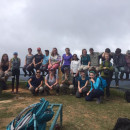
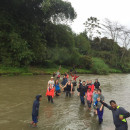
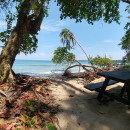
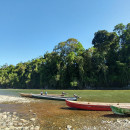
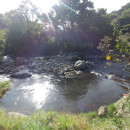
Personal Information
| How much international exposure did you have prior to this program? | 6 months+ |
Review Your Program
|
* Overall educational experience
Academic rigor, intensity, resources, etc. |
|
|
* Host Country Program Administration
On-site administration of your program |
|
|
* Housing:
How satisfied were you with your living arrangements? |
|
| * Food: |
|
|
* Social & Cultural Integration:
How integrated did you feel with the local culture? |
|
|
* Health Care:
How well were health issues addressed during the program? |
|
| * Safety: |
I think our group was lucky to not have been in any seriously dangerous situations, but we were made aware of the possibilities and tried to look out for each other as much as possible. The SIT staff members with us on the program were also on top of things regarding our safety, but gave us the freedom we were entitled to. |
| If you could do it all over again would you choose the same program? |
Yes
SIT Panama is a brilliantly designed program for students who would like hands on experience, as opposed to learning just from books. Being in the field and conversing with people there proved to be an excellent way to learn- those kind of experiences tend to stick with you. You meet some really amazing people through the program, who you would be highly unlike to cross paths with otherwise. These people, whether they are indigenous tribals or park rangers or researchers, have immense knowledge and are some of the warmest people I've met. One of my host mothers and I are still in regular contact, in fact! Simply by talking to those people about their lives, their experiences, their history, their opinions, I learnt more than I could've imagined. Panama is also a gorgeous country, home to an incredibly wide variety of ecosystems and landscapes. The program involves a lot of traveling, which we just couldn't get enough of; every place we visited was so hard to leave. The program also gives you some time to get involved in outdoor activities like horseback riding, snorkeling or even climbing up a volcano if you feel like it! The program staff that were with us in Panama during our Spring '17 semester were some of the most smart, hard working, caring, approachable people I know and we were quick to become family to one another. Needless to say, the friends I made through the group are lifelong friends, and people with whom I shared some really unique experience. Would 100% recommend SIT Panama! |
Finances
|
* Money: How easily were you able to live on a student's budget?
(1 = not very easy/$200+ on food & personal expenses/week, 2.5 = $100/week, 5 = very easily/minimal cost) |
I think this varied for each of us on the program. If you really want to be mindful of your budget, you definitely can. What I found worked for me was to be careful with my expenditures on on a regular basis, but allowed myself a little extra spending for new experiences that make for wonderful memories. |
| Not including program expenses, about how much money did you spend on food and other expenses each week? | Since at least 2 meals were taken care of by our host families, for a majority of our program, this wasn't too much of a hassle. |
| Do you have any general money-saving tips for future study abroad participants? | This is kind of difficult because when you're in a new place and want to explore it, you are bound to spend more than you usually would. But there are ways to kind of lessen those costs. For example, if you're staying at a hostel with kitchen facilities, you can cook for yourselves on a regular basis instead of going out to eat. There will probably also be activities that some members of the group want to take part in that doesn't necessarily work with your budget. For instance, some of my friends went to a trampoline park, and while we were sure that would have been a really fun experience, the rest of us didn't go and saved up by going to a park instead. It just depends on each individual's situation really. Also, while taking out cash at the ATM, we would try to do so in slightly larger amounts (but not too large) because there was a fee for every withdrawal. |
Language
| * Did your program have a foreign language component? | Yes |
|
How much did the program encourage you to use the language?
0 = No encouragement, 5 = frequent encouragement to use the language |
|
| How would you rate your language skills at the beginning of the program? | Beginner |
| How would you rate your language skills at the end of the program? | Intermediate |
| What was the highest level language course you had completed prior to departure? | I had only done a semester of Spanish before I left to Panama (our program doesn't have a language requirement). I don't think my grasp of the language as such improved very much because, but because I was exposed to it all the time, I gained a little confidence and realized it was okay to make mistakes. My familiarity with Spanish definitely improved though through the trip, because I would start being able to pick up bits of conversations that I was not able to do before. |
| How many hours per day did you use the language? | |
| Do you have any tips/advice on the best ways to practice the language for future study abroad participants? | I would suggest trying to get as familiar with a language as possible-through apps like Duo Lingo and Spanish Dict (for Spanish), movies/tv shows, the news, speaking to someone else who knows the language, and courses at your college if you have the time. |
Other Program Information
|
* Where did you live?
Select all that apply |
|
|
* Who did you live with?
Select all that apply |
|
|
* Who did you take classes with?
Select all that apply |
|
| About how many local friends did you make that you will likely keep in touch with? |
A Look Back
| * What did you like most about the program? |
|
| * What could be improved? |
|
| * What do you know now that you wish you knew before going on this program? | I wish that I could've been a little more familiar with Spanish before going, especially to be able to communicate with host families better. I also wish that I had more knowledge of general global issues, because the program gives you numerous platforms for discussion and sharing. |
Reasons For Studying Abroad
| To help future students find programs attended by like-minded individuals, please choose the profile that most closely represents you. |
The Avid AdventurerThe wardrobe you packed was better suited for a semester of camping than club hopping. Outdoorsy, you might forgo a crazy night out for an early all-day adventure. You'd rather take in the rich culture of an old town than the metropolis of a modern city, but for you getting off the grid is ideal. |








